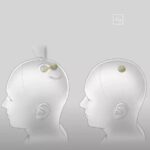Silicon Valley’s ambition extends beyond dominating the smartphone market, with tech leaders now venturing into uncharted territory: the human brain.
In response to stagnant smartphone innovation and slowing sales, the tech industry is exploring new frontiers, including brain interfaces, virtual reality (VR) headsets, and augmented reality (AR) goggles. This year marks a significant step forward, as companies like Neuralink, founded by Elon Musk, make strides in brain-computer interface technology.
![]()
Neuralink’s Brain Chip Implant
Elon Musk’s Neuralink recently made headlines as it successfully implanted a brain chip into its first human patient. Musk shared the news on social media, highlighting promising results in neuron spike detection. Neuralink’s ultimate goal is to develop a brain interface empowered by advanced artificial intelligence (AI), enabling individuals to control computers or mobile devices using their minds.
While Neuralink’s aspirations may seem like science fiction, the company emphasizes potential applications in medicine, particularly for individuals with limb disabilities. Musk envisions a future where individuals like Stephen Hawking can communicate more efficiently using Neuralink’s technology.
Despite Neuralink’s groundbreaking advancements, concerns linger regarding its safety and ethical implications. Reports of monkey fatalities following Neuralink trials have raised alarms, prompting federal investigations into potential violations of animal welfare regulations.
Competition and Global Interest
Neuralink isn’t the only player in the brain-computer interface arena. China’s Ministry of Industry and Information Technology has announced plans to develop rival brain-computer interfaces by 2025, intensifying competition in this emerging field.
![]()
Shift Towards Wearable Technology
In addition to brain interfaces, tech giants are investing in wearable headsets as alternatives to smartphones. Apple’s Vision Pro headset, priced at $3,500, integrates VR and AR technologies to create immersive internet experiences. Similarly, Meta, formerly Facebook, offers a range of headwear products, including the Meta Quest Pro and Meta Quest 3 VR headsets, along with the Meta Ray-Ban AR glasses.
These innovations represent a shift towards spatial computing, where digital content blends seamlessly with the physical world. As tech companies vie for dominance in this post-smartphone era, the human head emerges as the next frontier for technological advancement.






Leave a Reply